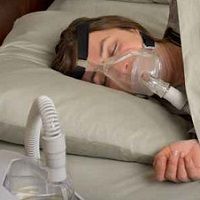Article
CPAP Use May Not Improve Diabetes Control
Author(s):
There’s bad news for people with diabetes who use continuous positive airway pressure (CPAP) treatment for obstructive sleep apnea. Contrary to some previous reports, CPAP will not boost diabetes control.

There’s bad news for people with diabetes who use continuous positive airway pressure (CPAP) treatment for obstructive sleep apnea. Contrary to some previous reports, CPAP will not boost diabetes control.
"Many studies have indicated that sleep apnea may contribute towards the development and progression of type 2 diabetes," said lead study author Jonathan Shaw, MD, associate professor and head of population health at the Baker IDI Heart and Diabetes Institute in Melbourne, Australia. "However, proving that link, and determining if treating sleep apnea could have benefits for glucose control, requires intervention studies. Some uncontrolled studies had reported improved glucose control after starting CPAP, but some small controlled trials did not support this."
The research team randomly assigned 298 patients in the U.S. and Australia with “relatively well-controlled” type 2 diabetes and newly diagnosed obstructive sleep apnea to usual care or care with CPAP for the sleep apnea. They measured change in glycemic control, changes in blood pressure, daytime sleepiness, and quality of life over six months.
There was no difference between those receiving CPAP and the control group in terms of glycated hemoglobin (HbA1c) levels at three and six months. There was however, a greater fall in diastolic blood pressure over six months in the CPAP group, compared the control.
This was only statistically significant among those who used the CPAP apparatus for at least 4 hours a night.
Daytime sleepiness improved significantly in the CPAP group based on the Epworth Sleepiness Index. In addition, quality of life was not significantly different overall between the group based on the RAND 36-Item Short Form Health Survey, although among those who wore the CPAP for at least 4 hours a night, there were some differences on vitality and mental health subscores. The results were published online ahead of print on February 29 in the American Journal of Respiratory and Critical Care Medicine.
The authors offered several possible explanations for their findings. One is that obstructive sleep apnea may play a bigger rule in the development of type 2 diabetes than it does in controlling existing diabetes. They also suggested that using CPAP for more than 4 hours a night, or including people with more severe sleep apnea or poor glycemic control may have caused a starker difference between the two groups.
"Obstructive sleep apnea is common in people with type 2 diabetes, and although we did not find a glycemic benefit for its treatment, clinicians should have a high index of suspicion for its presence when patients experience daytime sleepiness, snoring and resistant hypertension," said Shaw. "Identification and treatment of obstructive sleep apnea in these patients may lead to clinically meaningful benefits."





